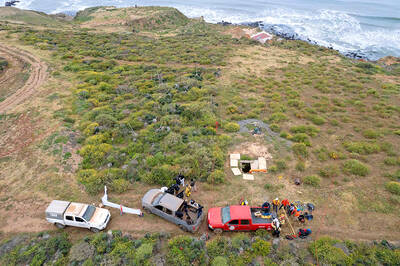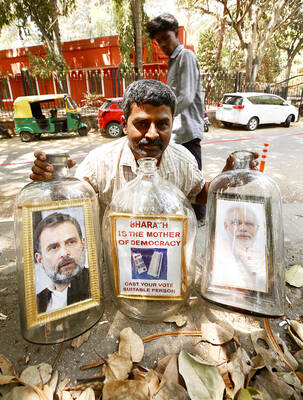The eight Arctic Council nations on Friday pledged to do more to combat climate change that is shrinking the vast frigid region, with nations trying to put aside disputes over issues like Russia’s intervention in Ukraine.
Meeting in the Canadian town of Iqaluit, 300km south of the Arctic Circle, Canada, Denmark, Finland, Iceland, Norway, Russia, Sweden and the US pledged to work to address emissions of black carbon and methane.
Both are seen as particularly harmful to the Arctic, whose sea ice this year was the smallest in winter since satellite records began in 1979, according to US data.
The region is warming at twice the rate of other parts of the globe, which both threatens traditional communities even as it opens up new sea lanes, and vast oil and mineral resources.
During the meeting, the nations sought to play down their divisions, notably over Russia’s annexation of Crimea from Ukraine in March last year as well as the West’s view — denied by Russia — that Russian troops support separatists in eastern Ukraine.
Russia also caused unease last month when it began military exercises across the nation, including in the Arctic, involving more than 45,000 troops as well as war planes and submarines.
Canadian Minister of the Environment and host Leona Aglukkaq did not mention Ukraine during the day’s talks, but told a closing news conference that she raised it in private with Russian Minister of Natural Resources and Environment Sergei Donskoi.
“I did have a brief discussion ... to state again that we condemn the actions of Russia with Ukraine and that was it,” she said, adding that she did not expect Russian military exercises to harm work in the council, which does not deal with security.
Donskoi said the Arctic was too important to be affected by outside issues.
“There is no room here for confrontation or for fear mongering,” he said during the council meetings.
At a closing news conference, US Secretary of State John Kerry said he had “very directly” challenged Russian Minister of Foreign Affairs Sergei Lavrov in a telephone call this week about the presence of Russian military personnel and equipment in Ukraine.
“We have to continue to keep the pressure on,” Kerry said of maintaining economic sanctions on Russia.
However, he said Lavrov, who did not attend the Arctic talks, “made it crystal clear to me that Russia wants the council to be successful ... and that it’s their intent to cooperate with us on the protection of the environment.”
The most tangible result of the council meeting was a fresh nonbinding pledge to do more to fight black carbon and methane.
Emitted by diesel engines and wood-fired cooking stoves, black carbon settles on snow and ice, making it retain more warmth and melt faster. Methane is a greenhouse gas that, once released into the atmosphere, also causes the earth to retain heat.
The US, which is scheduled to chair the council for the next two years, hoped to adopt “an ambitious collective goal on black carbon” by the group’s next meeting in 2017, Kerry said.

With the midday sun blazing, an experimental orange and white F-16 fighter jet launched with a familiar roar that is a hallmark of US airpower, but the aerial combat that followed was unlike any other: This F-16 was controlled by artificial intelligence (AI), not a human pilot, and riding in the front seat was US Secretary of the Air Force Frank Kendall. AI marks one of the biggest advances in military aviation since the introduction of stealth in the early 1990s, and the US Air Force has aggressively leaned in. Even though the technology is not fully developed, the service is planning

Le Tuan Binh keeps his Moroccan soldier father’s tombstone at his village home north of Hanoi, a treasured reminder of a man whose community in Vietnam has been largely forgotten. Mzid Ben Ali, or “Mohammed” as Binh calls him, was one of tens of thousands of North Africans who served in the French army as it battled to maintain its colonial rule of Indochina. He fought for France against the Viet Minh independence movement in the 1950s, before leaving the military — as either a defector or a captive — and making a life for himself in Vietnam. “It’s very emotional for me,”

INTERNATIONAL PROBE: Australian and US authorities were helping coordinate the investigation of the case, which follows the 2015 murder of Australian surfers in Mexico Three bodies were found in Mexico’s Baja California state, the FBI said on Friday, days after two Australians and an American went missing during a surfing trip in an area hit by cartel violence. Authorities used a pulley system to hoist what appeared to be lifeless bodies covered in mud from a shaft on a cliff high above the Pacific. “We confirm there were three individuals found deceased in Santo Tomas, Baja California,” a statement from the FBI’s office in San Diego, California, said without providing the identities of the victims. Australian brothers Jake and Callum Robinson and their American friend Jack Carter

Indian Prime Minister Narendra Modi reaffirmed his pledge to replace India’s religion-based marriage and inheritance laws with a uniform civil code if he returns to office for a third term, a move that some minority groups have opposed. In an interview with the Times of India listing his agenda, Modi said his government would push for making the code a reality. “It is clear that separate laws for communities are detrimental to the health of society,” he said in the interview published yesterday. “We cannot be a nation where one community is progressing with the support of the Constitution while the other